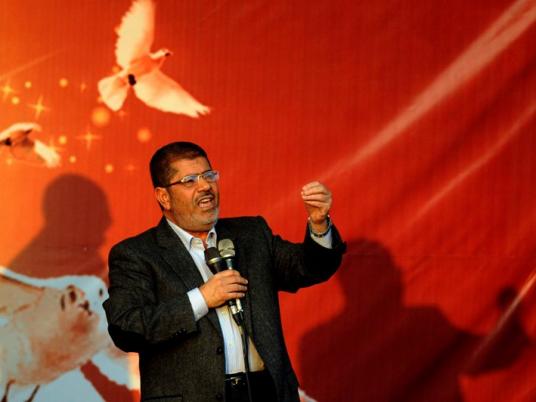
Contrary to an earlier interview in November, President Mohamed Morsy's two hours long interview with media host Amr al-Leithy was much more self-congratulatory in tone.
Morsy presented himself repeatedly as a leader who consults groups of various political stripes before taking any decision, also reiterating that the Muslim Brotherhood, to which he belongs, has never intervened in his work.
In a pre-recorded interview, aired at 2 am Monday morning after a six-hour delay, Morsy used the phrase “A president for all Egyptians” at least seven times. He pointed a number of times throughout the interview to his openness to criticism and his keen awareness of the common citizen's concerns, in contrast, Morsy said to the regime of former President Hosni Mubarak.
When it came to “thugs,” however the tone became stronger, and occasionally he waved a threatening finger. He would “never be lenient” he said with “thugs” who have been trying to divert the Egyptian revolution from its peaceful path by committing acts of violence and intimidation.
Morsy’s answers maintained the familiar mantra of accusing hired protest infiltrators of violence. When asked whether he had ever cried during his presidency, he replied "There are two kinds of crying: one is privately, which I do much while supplicating to God in solitude, and the other kind happened once when I learned about a child found holding his birth certificate, which his mother put in his pocket in return for LE600 to throw Molotovs [during protests].”
Speaking about the Armed Forces, the police, and the intelligence, Morsy referred a number of times to the appreciation and respect he has for these state institutions.
At the beginning of the interview, Leithy in a surprise question asked the president who rules Egypt, and asked specifically if it was the Freedom and Justice Party or the Brotherhood’s Guidance Bureau. After appearing taken aback, Morsy replied, that the “The people are the rulers.”
“You had promised in an earlier interview to step down if the people call for it”, Leithy asked Morsy. “I am a president for four years according to the Constitution,” was Morsy’s reply.
Morsy was asked if he admitted to his mistakes. Although he answered that “only prophets are impeccable,” later in the interview he said, “sometimes I persist with a decision I have taken and never go back on it as a president of the republic, that’s when I believe it is the right thing”.
The president said he has made mistakes during his seven months in office, mentioning two in particular. The first, he said, was backtracking on the November constitutional declaration, which had immunized his decisions against judicial challenge, insisting that the declaration was for the good of democracy. The second mistake, he explained, was setting a date for parliamentary elections on 27 April which coincided with Coptic feasts. In response to criticism, the president brought the elections forward to 22 April.
The interviewer, again, confronted the president with a pledge he did not fulfill as president, asking him why he imposed a state of emergency on the Suez Canal provinces of Ismailia, Port Said, and Suez in January. “They [the citizens of those cities] asked for it. I had to do it,” was his reply.
Morsy declared a state of emergencies on the three provinces following bloody clashes between security and anti-regime protesters marking the second anniversary of the 2011 uprising.
The president believes the current civil disobedience in Port Said, which has hindered activities at several state institutions and businesses, is an act of “thuggery.” He said that civil disobedience should not involve the possession of weapons or forcing employees to leave offices.
People in Port Said have been protesting a death sentence issued last month against 21 fellow citizens charged with murdering over 70 football fans following a premiere league match in February 2011 that came to be known as the Port Said Massacre. Protesters are also demanding accountability for the death of nearly 40 who engaged in clashes with security following the court ruling.
Morsy defended the current Hisham Qandil Cabinet against accusations of failure. “Mr President, the government has caused a big problem declaring that a citizen’s quota of bread would stand at only three loaves,” Leithy said. Morsy stated that this is “untrue” and that “Bread is available and anybody can take the amount he needs.”
Earlier this month, Supply Minister Hatem Ouda had said that the government would provide each citizen with three loaves of bread.
Morsy read the Quranic verse, “And fear the day when you will be returned to Allah,” which, he said, had been placed in his office since his election as a sign of his piety and his faithfulness to Allah and to the Egyptian people.
Morsy emphasized he has no issues with any political party. “I have no problem with any party…such as the Nour Party, Asala Party, Construction and Development Party, and Wasat Party, I respect and value them all,” the president said, referring to four Islamist parties.
Asked about protests by his Islamist supporters which besieged the Supreme Constitutional Court in December, Morsy replied, “The Ettehadiya Presidential Palace, where the president resides, had also been under siege…but I do not accept any judicial body to be besieged”.
Morsy’s supporters protested outside the court when it was considering lawsuits demanding the dissolution of the Islamist-dominated Constituent Assembly and Shura Council.
Several opposition protests over the past months also occurred outside the presidential palace, culminating in clashes with security forces and attacks on the building.
“Forgive my faults,” Morsy said, addressing Egyptians, but by the end of the interview, he adopted a stronger tone, “We are thick-skinned…We would march on barbed wire to achieve our goals”.




